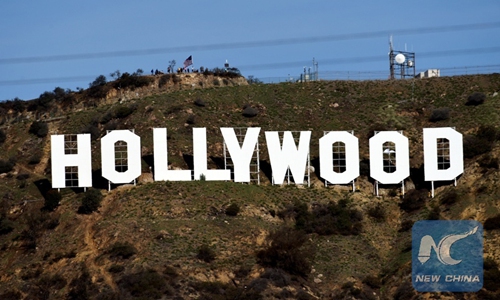HOME >> ARTS
Film, TV industry insiders eye more opportunities in China
Source:Xinhua Published: 2019/11/14 17:53:40

Photo: Xinhua
There are more opportunities to further deepen exchanges and cooperation between the film and TV industries of China and the US, industry insiders from both countries have said.
"It is important to explore mutually-beneficial cultural relationships between the United States and China. We have much to offer each other," Liao Ken, vice chairman of the China Television Artists Association, said at the 2019 US-China Television and Film Innovation Summit.
Liao led a Chinese delegation of television and film industry insiders to Hollywood from Sunday to Tuesday, during which the delegation attended the summit and met with representatives from the Writers Guild of America (WGA), the Producers Guild of America (PGA) and high-profile Hollywood production companies.
"We look forward to working together with Hollywood experts," said Zhang Heng, vice president of Chinese streaming giant iQIYI, also a member of the delegation.
"When I first went to China in 1997, I believe there were about 1,000 cinema screens and a box office of probably $150 million. Now, 22 years later, there are 60,000 cinema screens and a box office of nearly $9 billion - that's something to take seriously," said US producer Arthur Sarkissian, who was mainly known as one of the producers of Chinese movie star Jackie Chan's Rush Hour series.
Chris McGurk, chairman and CEO of US entertainment company Cinedigm whose new platform Bambu is providing Chinese and Asian-centric programming for the US market, said that "there should be one or more online services to stream Chinese content to American audiences."
"China produces some great content, but nobody watches it in the US yet. It hasn't found a market here," McGurk said.
"A platform with tons of data on what Americans like or don't like can be extremely helpful," he added.
"The most important contributor to our success was that we respected the culture and people of China, and their differences. A lot of research went into getting it right," Belle Avery, producer of US-China co-produced hit The Meg, told the Xinhua News Agency at the summit.
It is important to find "the right partner with a similar shared business approach, business ethics and transparency," explained Ellen Eliasoph, CEO of pioneering China-US joint venture Perfect Village Entertainment.
Elizabeth Daley, dean of the School of Cinematic Arts of the University of Southern California, encouraged filmmakers to accept and navigate genuine differences between the two countries in the co-production process.
"One of the mistakes we make as Americans is we think everybody is just like us, and other cultures think everybody is just like them. We're both wrong," Daley said.